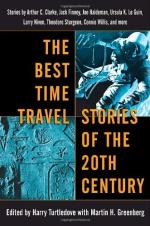|
This section contains 4,501 words (approx. 16 pages at 300 words per page) |

|
SOURCE: Byrne, Deirdre. “Truth and Story: History in Ursula K. Le Guin's Short Fiction and the South African Truth and Reconciliation Commission.” In Future Females The Next Generation: New Voices and Velocities in Feminist Science Fiction Criticism, edited by Marleen S. Barr, pp. 237-46. Lanham, Md.: Rowman and Littlefield, 2000.
In the following essay, Byrne argues that Le Guin's “recent Science Fiction and the South African Truth and Reconciliation Commission Share important assumptions about truth, story, and how history is made.”
Leon de Kock approaches history with particularly South African skepticism when he comments that the dialogue between events and history is inevitably agonistic, especially when cast in postmodern/poststructuralist terms (de Kock, Civilising 25-26). This is, in part, because events partake of an extra-discursive “reality,” whereas accounts are inscribed with textuality and mediacy that make them susceptible to lying (or at least to partiality and to being co-opted...
|
This section contains 4,501 words (approx. 16 pages at 300 words per page) |

|


